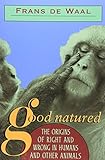I am curious why people keep taking this attitude to Dawkins. And Dawkins himself was also curious why people had this reaction to his books. In his 1976 book The Selfish Gene, he says:
"We can rise above our genes, indeed, we do every time we use contraceptives."
As he makes clear, several times, in the book, our evolution allows a range of behavior that allows for more than simplistic game-theory calculations.
Personally, there were 2 main things that I got from The Selfish Gene:
1.) sometimes simple experiments, with simple motivations, lead to surprising results (or sometimes game theory models have surprising conclusions). For instance, the story of the 2 pigs was surprising -- they had to push a lever on one end of the pen to get a reward at the other end of the pen, and it turned out that it was the dominant pig who had to do all the work whereas the submissive pig got to eat most of the food.
2.) evolution is too slow to react to fast changing circumstances, so behavior was "invented" to allow creatures to quickly adapt to circumstances. The word "behavior" in this sense, is meant to suggest a range of possible actions that a creature can change without having to change its genes. Dawkins devotes a lot of time to this idea, and it seems to me this idea goes directly against the interpretation that so many people want to ascribe to Dawkins: "it risks creating a self-fulfilling prophecy of barbarism".
I suspect that a lot of people who criticize Dawkins have never actually read Dawkins.
This sentence deserves special criticism:
"How is it even possible to behave in a non-animalistic manner once you have internalised these ideas?"
Here the word "animalistic" is being used to suggest a failure of morality. There is history behind this usage, which I don't have time to get into. For now, I'll simply point out that humans are part of the animal branch of life, and therefore all human behavior is animalistic by definition.
The above sentence suggests that being an animal leads to immoral behavior. Frans B. M. de Waal has been especially good about undermining this idea:
http://www.amazon.com/Good-Natured-Origins-Humans-Animals/dp...
Good Natured: The Origins of Right and Wrong in Humans and Other Animals
Kindness is also a product of evolution. Our sense of decency is also a product of evolution. To be clear about this, all human behavior has been facilitated by evolution. Our genes do not control us in a rigid and deterministic way, but our genes do establish perhaps the outer limits of the possible for us. It might be best to use the word "facilitate" when describing the effect of evolution on our behavior.
When Saint Francis of Assisi gave all of his possessions to the poor, his actions were facilitated by evolution.
When Hitler ordered 6 million Jews killed, his actions were facilitated by evolution.
When marine Jason Dunham decided to sacrifice his life to save his fellow soldiers, by diving on top of a hand grenade, his actions were facilitated by evolution.
When Susan Leigh Vaughan Smith killed her 2 children, her actions were facilitated by evolution.
When Adrienne Rich decided to write a book denouncing male-dominated family life, and when she came out as a lesbian, her actions were facilitated by evolution.
When George F. Gilder wrote a book denouncing feminism, his actions were facilitated by evolution.
What we are capable of has been facilitated by our history so far, all 4 billion years of it. This includes all behavior, including what some might regard as "good" and some might regard as "bad". But, while keeping all this in mind, it is also important to realize that we are still evolving today, still inventing the new, day by day. Possibly the pace is so slow that it is hard to see, but still, evolution is still happening, for every species on the planet, including humans. If we could get in a time machine and skip 100,000 years in the future, we would probably note the emergence of many new behaviors in the human line.
I picked this book up for like $1 or something at the annual Penn State book sale (all books not sold are pulped) and it's been very influential for me.
He has a fascinating discussion on the "circle of empathy" and how it widens as our resources increase (from family unit, to tribe, clan, nation, world, and finally non-human animals...).
Great read!


Even so, it can be tricky. In Bernd Heinrich's excellent "Mind of the Raven" [2], he points to a story where a woman, lost in the wilderness, noticed a raven crying near her and spotted something like a mountain lion creeping up on her. In the news story she gave the raven credit for warning her and saving her life. But Heinrich points out that ravens have a demonstrated history of leading predators to prey, because that way they get the leftovers with much lower risk. So although the woman was correct that the raven understood her danger and was demonstrating advanced social cooperation, her anthropomorphic bias led her to perhaps be dangerously wrong about who the raven was trying to help.
So although I think shorthand like, "The octopus is playing" is fine for casual use, I think serious people have to always be challenging those tempting assumptions.
[1] e.g., this book https://www.amazon.com/Good-Natured-Origins-Humans-Animals/d... or this TED talk: https://www.youtube.com/watch?v=meiU6TxysCg
[2] A stellar book, and I recommend it strongly to anybody fascinated by corvids or interested in decoding animal behavior more generally: https://www.harpercollins.com/products/mind-of-the-raven-ber...